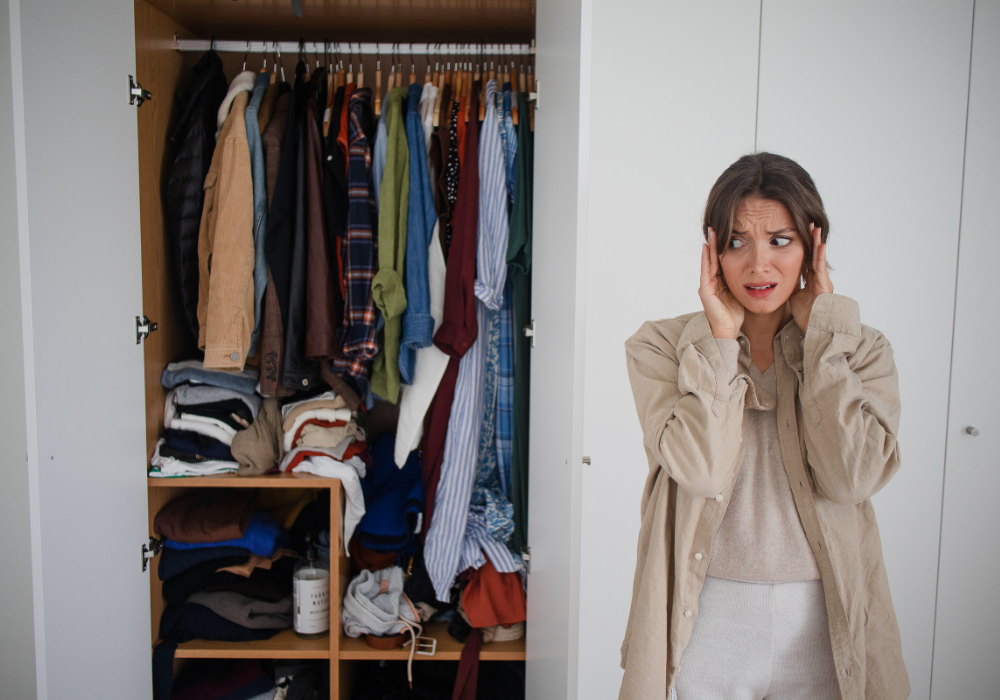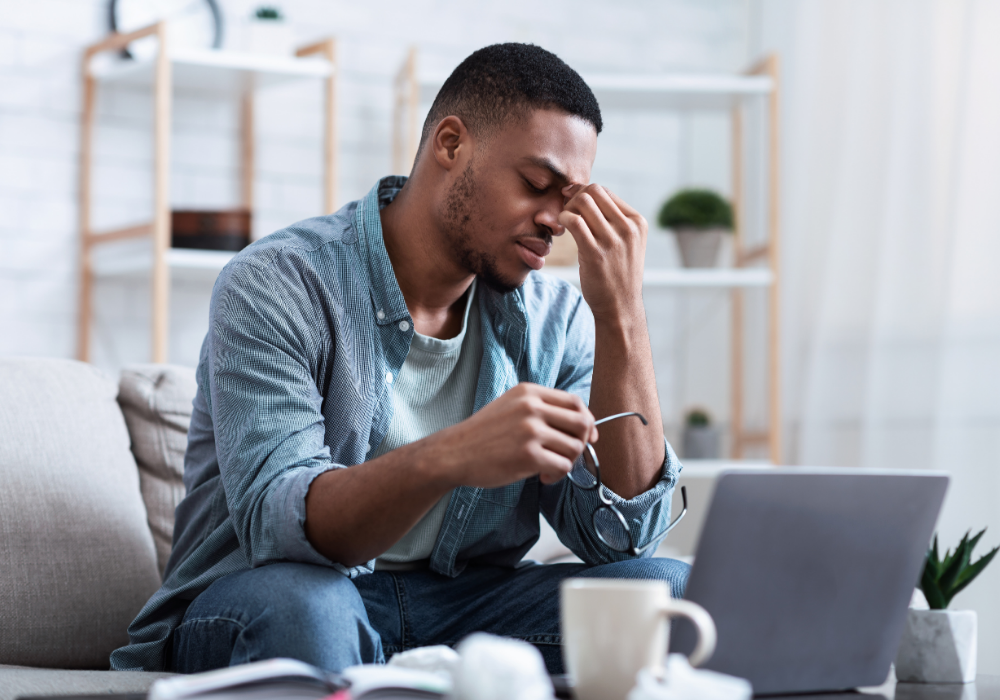Owning less isn’t about sacrifice, it’s about making space for what actually matters.

Clutter isn’t just a mess in your home, it’s a mess in your mind. When every surface is covered, every drawer is overflowing, and every closet is crammed, it’s no wonder stress and anxiety levels skyrocket. Studies show that too much physical clutter can overload the brain, making it harder to focus, relax, or feel in control. But living more simply isn’t just about clearing space—it’s about clearing mental fog, reducing decision fatigue, and making life feel lighter.
Whether it’s letting go of impulse buys, sentimental clutter, or the fear of “what if,” shedding unnecessary possessions can have a powerful effect on mental well-being. It’s not about deprivation but about choosing what actually adds value to your life. Here’s how simplifying your space, routines, and mindset can create a calmer, clearer, and happier version of you.
1. Too much clutter creates unnecessary stress.

When your space is overflowing with stuff, your brain takes on extra work without you even realizing it. Every time you see piles of clothes, unopened packages, or forgotten gadgets, your mind registers unfinished tasks. Researchers at Stanford University have found that clutter increases cortisol levels, the hormone responsible for stress, making it harder to feel relaxed in your own home. Instead of being a place of rest, your space becomes a constant reminder of everything that needs to be sorted, cleaned, or put away.
On the flip side, studies show that decluttering can lower stress and create a sense of control. Even small steps, like clearing off a table or donating old clothes, can give your brain a break. When your surroundings feel lighter, so does your mind. Living simply doesn’t mean stripping everything down to the bare minimum, but rather curating a space that supports calm rather than chaos.
2. Decision fatigue fades when you own less.

Every item in your space represents a decision. What to wear, what to use, what to keep—these constant choices add up, draining your mental energy before the day even begins. Doctors in the American Medical Association refer to this as decision fatigue, which makes even simple tasks feel overwhelming. When your closet is packed with clothes you rarely wear or your desk is buried in paperwork, small decisions become exhausting obstacles.
Simplifying your belongings reduces the mental load. Having a thoughtfully curated wardrobe makes getting dressed easier. Owning only the essentials in your kitchen streamlines cooking. Cutting down on possessions means cutting down on unnecessary choices, freeing up energy for things that actually matter. The less time you spend stressing over trivial decisions, the more clarity you have for creative thinking, problem-solving, and enjoying life.
3. A minimalist space leads to a clearer mind.

The state of your environment affects the state of your thoughts. When your space is cluttered, your mind has to process a constant stream of visual distractions. Research done by mental health counselors has shown that messy spaces can reduce focus and increase anxiety, making it harder to concentrate or feel at peace. A minimalist space, on the other hand, helps your brain relax, making room for deeper thinking and emotional balance.
This doesn’t mean your home has to look like a showroom with nothing but neutral tones and empty shelves. It’s about creating an environment that works for you—one that feels open, inviting, and aligned with what you actually need. A tidy, intentional space makes everyday life feel more effortless, helping you move through your day with a sense of ease rather than being bogged down by cluttered chaos.
4. Letting go of stuff teaches emotional resilience.

Holding onto things “just in case” often has little to do with practicality and more to do with emotional attachment. Whether it’s gifts you never use, clothes that no longer fit, or items tied to old memories, clutter often carries unspoken emotional weight. Letting go of these things can feel uncomfortable at first, but it’s also a powerful exercise in emotional resilience.
Learning to part with objects that no longer serve you strengthens your ability to navigate change. It reinforces the idea that your memories aren’t tied to things, but to experiences. Each time you let go of an item you don’t truly need, you gain confidence in your ability to trust yourself rather than hold onto the past out of fear or guilt.
5. A simple lifestyle means more time for what actually makes you happy.

The more things you own, the more time you spend maintaining them—cleaning, organizing, fixing, or stressing over where to put them. A cluttered home often leads to a cluttered schedule, filled with obligations that don’t actually add joy or value. When you cut down on unnecessary possessions, you naturally free up time for experiences that matter.
Instead of spending your weekends reorganizing, you can use that time for hobbies, relationships, or simply relaxing without feeling like there’s always something to do. Living simply doesn’t mean having nothing, it means making sure that what you do have adds to your happiness rather than distracting from it.
6. Minimalism helps break the cycle of consumerism.

Shopping often feels like a quick fix for stress, boredom, or emotional discomfort. But the temporary high of buying something new fades fast, often leaving behind buyer’s remorse or more clutter. The cycle of wanting, buying, and accumulating can easily spiral into a pattern where possessions become a source of frustration rather than satisfaction.
Living with intention helps break that cycle. When you stop chasing the next purchase, you realize that most things marketed as “must-haves” aren’t necessary at all. Choosing to own less isn’t about deprivation—it’s about stepping off the consumer treadmill and finding fulfillment in things that don’t come with a price tag.
7. Digital clutter affects mental health too.

Clutter isn’t just physical—it’s digital too. Overflowing inboxes, endless notifications, and too many apps create the same sense of overwhelm as a messy home. Studies suggest that constant digital distractions increase stress and reduce attention span, making it harder to focus or feel present.
Simplifying your digital life by unsubscribing from emails, turning off unnecessary notifications, and decluttering your phone or computer can have a noticeable impact on mental clarity. Just like a clean space helps clear your mind, a streamlined digital life reduces background stress and allows for more intentional engagement with the world around you.
8. Owning less fosters gratitude for what you already have.

When you constantly chase more—more clothes, more gadgets, more status symbols—it’s easy to overlook what you already own. Gratitude gets lost in the endless pursuit of “better” and “new.” Minimalism shifts the focus from what’s missing to what’s meaningful, making it easier to appreciate what’s already in your life.
This mindset doesn’t just apply to material possessions. It extends to relationships, experiences, and even personal achievements. When you stop measuring happiness by what you own, you start finding it in everyday moments that were always there but were buried under the distraction of excess.
9. Living simply helps build healthier habits.

A clutter-free lifestyle often leads to better routines. When your space is organized, it’s easier to cook at home instead of ordering takeout, make time for exercise, or stick to a nighttime routine without getting sidetracked by piles of unfinished projects.
Simplicity creates space for healthier choices. Without the mental load of constant clutter, you have more energy to focus on habits that nourish your well-being. Whether it’s better sleep, mindful eating, or regular self-care, shedding excess often leads to prioritizing what truly matters for both your physical and mental health.
10. Letting go of clutter is an act of self-care.

At its core, decluttering isn’t just about getting rid of stuff—it’s about creating an environment that supports your well-being. When you choose to let go of excess, you’re choosing to make your space one that nurtures calm instead of chaos.
Living simply is a form of self-care that extends beyond a clean room or an organized closet. It’s about giving yourself permission to release the things that drain your energy and embracing a life that feels lighter, clearer, and more intentional.
